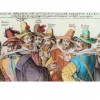Book Review – The Gap of Time
an edited version of this review was published in The Times, 19 September 2015
THE GAP OF TIME: THE WINTER’S TALE RETOLD 320pp. Hogarth £16.99; 9781781090299
by Jeannette Winterson
Time, in The Winter’s Tale, tries all. Leontes, King of Sicilia, convinces himself his wife’s unborn child is not his own: time proves him wrong, but it’s another 16 years before his family heals. First, amid a show trial for adultery, Queen Hermione collapses and gives birth to their daughter. Leontes insists his best friend, Polixenes, the king of Bohemia, is the father, and orders a reluctant courtier to expose the child, disowning it. Hermione and her older son both seem to die from the stress; and Leontes, finally repentant, becomes a broken man.
The winter of Sicilia gives way to the summer of Bohemia. Here, Leontes’s lost daughter grows up as Perdita, adopted by a shepherd and destined for the love of Florizel, rebellious son of Polixenes. Coming of age at a harvest festival, these children renew their fathers’ fractured lives.
So in the first of Hogarth Press’ new series of Shakespeare adaptations, Jeannette Winterson has taken Perdita’s story and crafted it into an up-to-the-minute tale of broken families and twenty-first century redemption. Where Shakespeare had pastoral romance, Winterson has last spring’s internet hit, 36 Questions To Make You Fall In Love.
This isn’t a new idea: often The Gap in Time feels like a more lyrical, intricately-plotted successor to Marina Warner’s 1992 novel Indigo, based on The Tempest. What makes The Gap of Time a success is Winterson’s sensitivity to the shape-shifting qualities of the original. In The Winter’s Tale, children are pages imprinted with their father’s text; sheet music is pirated wholesale; a sculptor fashions the perfect image of Leontes’ dead queen, but she’s too lifelike to stay stone for ever. It’s a story about how we recreate the things we love.
So it’s apt that Winterson calls this her “cover version” of her favourite play. Our modern ‘Leo’ is, of course, a banker. He’s also convinced that his beautiful, bisexual best friend Xeno (Polixenes) has impregnated his singer wife MiMi (Hermione). Just as in The Winter’s Tale the baby is abandoned and found by Shep, a black man. And the story recreates itself again.
Seductive, troubling art forms come to life within its pages: Leo searches out his lost MiMi in a high-concept video game; The Roundhouse venue in London is transformed into a water sculpture, masking an exploitative new housing development. The 2008 crash inspires some of Winterson’s cruder capitalist stereotypes, but Winterson’s spare, knowing prose soon takes us into Leo’s more textured history: his courtship of MiMi, his intimacy with Xeno, his fear, above all, of failing his son. There’s art and enchantment here, along with a fair dose of Melanie Klein’s Object Relationships Theory.
Shakespeare’s Leontes and Polixenes were always close. It’s no surprise, then, that Winterson makes some desires more explicit. Dissatisfied with webcamming MiMi’s bedroom, Leo imagines himself “in her cervix, waiting with his mouth open for Xeno to worm his way in”. Penance, too, gets a wry modern update: Pauline, Leo’s business partner, bullies him into 20 years of reluctant ethical investment.
Meanwhile, Perdita is growing up in New Bohemia, Louisiana, raised by Shep, a god-fearing African-American and the novel’s real hero. Winterson made her name with Oranges Are Not The Only Fruit, a memoir of her childhood in a fundamentalist church, and she’s fluent in the biblical language of the American South. Nonetheless, her idea of a black man’s inner monologue can be overly earnest. Her other characters, too, seem to shoe-horn plot explanations into casual dialogue. (“Look, I know you find it odd I had a child with a woman I don’t live with or love,” says Xeno in an early scene.)
Every image from The Winter’s Tale finds its mirror here: twins and fallen angels abound. The intricacy with which Winterson has plotted her novel against each Shakespearean detail will delight readers familiar with the original: Autolycus, the pirated ballad-seller, is now selling retro-cars (the Mercury is popular) with dodgy celebrity backstories. Gonzalez (Antigonus in Shakespeare’s version) isn’t pursued by a bear, but mugged by thugs as he hides Perdita by a controversial BabyHatch. Shep and his son Clo attempt to rescue him, but are fearful to hand the baby in (“How did I raise a son who trusts the cops?”, says Shep). But Winterson can’t resist a joke at Shakespeare’s most famous stage direction: a few pages later, Clo turns left off the highway to exit Bear County.
Jarring moments persist (a nasty oligarch called Oshitavitch?); Pauline even quotes The Winter’s Tale explicitly, without cottoning on to the fact that all her friends are living it. But it’s part of a vision of a world in which past, present, and future are lived simultaneously, original and adaptation existing in the same moment. Real people jostle alongside myths: George Whitman, of the Paris bookshop Shakespeare & co, probably counts as both.
Next year, the Hogarth Shakespeare project gives us Howard Jacobson on Shylock and Margaret Atwood on The Tempest. It never looked like a gimmicky franchise, but Winterson could have given it no more beguiling a prologue.



